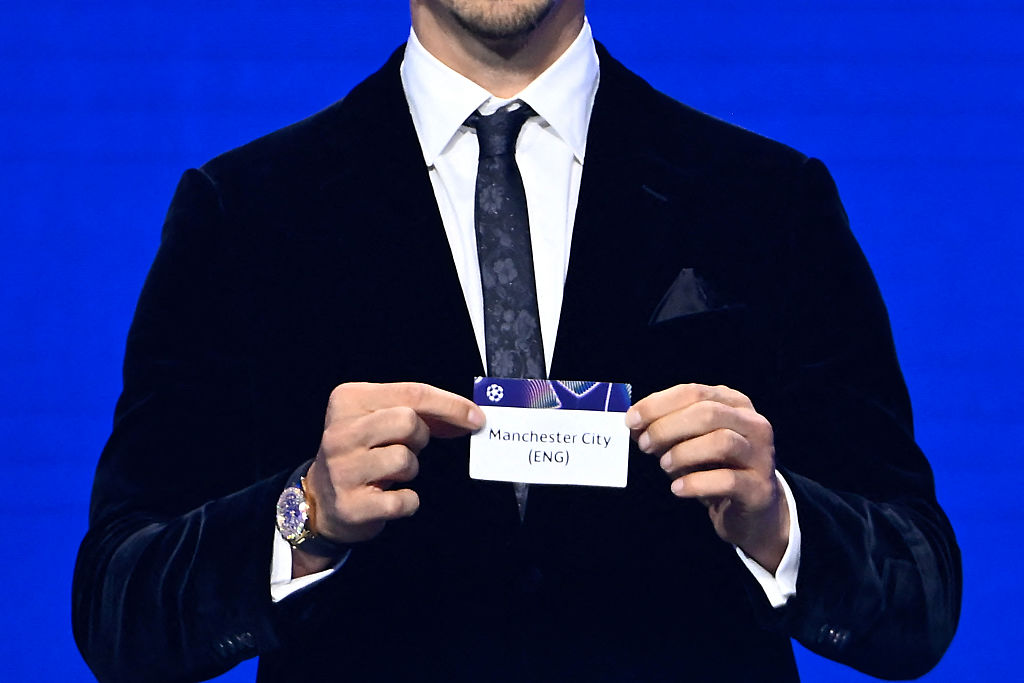Rio Ferdinand interview: "I was so happy that Edwin van der Sar saved Anelka's penalty in 2008... I was next and wouldn't have scored!"
In 2008, Rio Ferdinand added his name to an exclusive list of Manchester United captains to lift Ol’ Big Ears – and changed his life forever. He recalls the ecstasy of victory in Moscow, plus more defining moments that made him playing for West Ham, Leeds and England
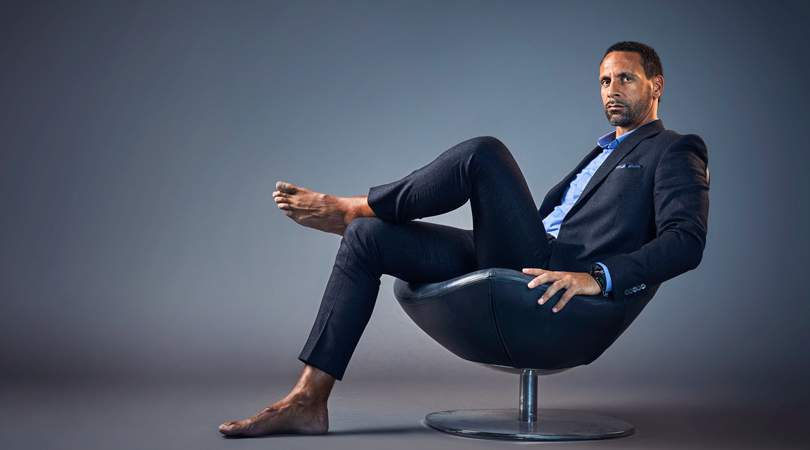
The best features, fun and footballing quizzes, straight to your inbox every week.
You are now subscribed
Your newsletter sign-up was successful
Want to add more newsletters?

Five times a week
FourFourTwo Daily
Fantastic football content straight to your inbox! From the latest transfer news, quizzes, videos, features and interviews with the biggest names in the game, plus lots more.

Once a week
...And it’s LIVE!
Sign up to our FREE live football newsletter, tracking all of the biggest games available to watch on the device of your choice. Never miss a kick-off!
Join the club
Get full access to premium articles, exclusive features and a growing list of member rewards.
The time was 1.45am when Bobby Charlton approached Rio Ferdinand. More than 10 years on, as he sits in front of FourFourTwo, there’s still a slight tremble in Ferdinand’s voice as he remembers the words that followed.
The duo were stood inside Moscow’s Luzhniki Stadium, and Ferdinand was moments away from collecting the Champions League trophy as Manchester United captain. Minutes earlier, long past midnight in the Russian capital, United had beaten Chelsea on penalties – 40 years after the club’s maiden European Cup triumph over Benfica, and 50 on from the Munich air disaster.
“As Chelsea were going to get their medals, Sir Bobby came to the bottom of the steps,” Ferdinand tells FFT now. “He said, ‘Rio, do you know what this means?’ Even though we’d just won the Champions League final, I hadn’t given it any thought. He said, ‘Rio, you’re the third person to lift this trophy for this club, and I’m one of them as well. This will change your life.’ He’s a legend for club and country. He said some other words too, and they were just beautiful. I started getting all emotional.”
In that moment, Ferdinand had reached the pinnacle of a glorious career; one in which he twice became the most expensive defender in the world, won six Premier League titles and amassed 81 caps for England. Among centre-backs, only Bobby Moore and Billy Wright have ever earned more.
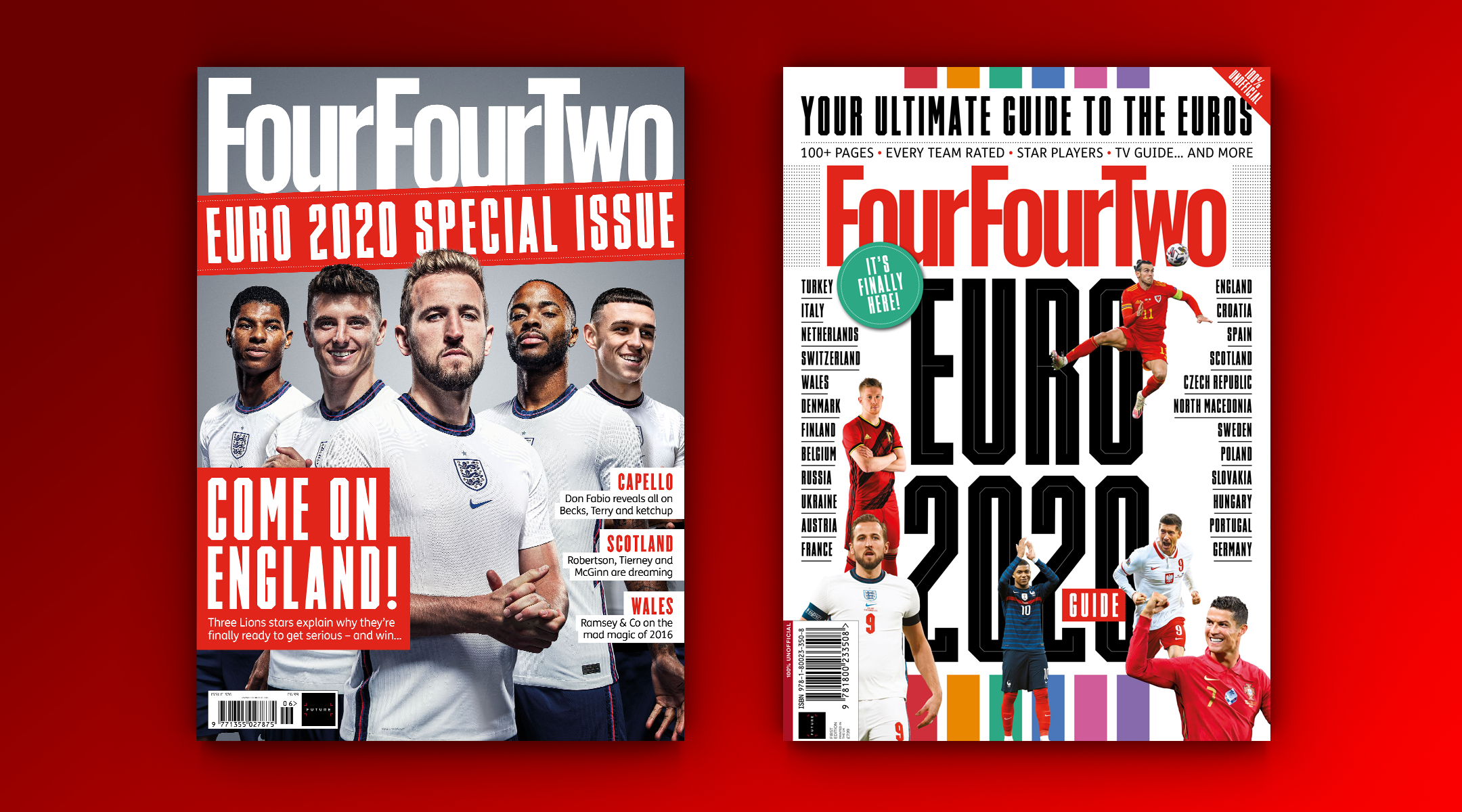
Such greatness never seemed possible for Ferdinand as a youngster growing up in Peckham, south London. Back then, he had another hobby – aged 11, he received a scholarship to attend the Central School of Ballet. If it seemed an unlikely choice, ultimately it would help his ambitions of becoming a footballer. “Strength, suppleness, poise, balance – it enhanced all of those things,” he says.
Ferdinand’s graceful skills were initially deployed in midfield. He was later asked to move into defence, but wasn’t keen on the idea. “I was 14 and someone said, ‘Rio, I don’t want you to play in central midfield anymore, I want you to play centre-back’,” he remembers. “Being a centre-back wasn’t fashionable – I wanted to be a central midfielder who scored goals and was the star.
“They said, ‘Yeah, but I think you’ve got a better chance of being a defender.’ I think I sulked for about two or three weeks, but then I realised, ‘Actually, you know what? This is my best route if I want to be a professional footballer.’”
The best features, fun and footballing quizzes, straight to your inbox every week.
Indeed it was. Ferdinand would swiftly make a career for himself as a ball-playing centre half. “I was still doing midfielder things as a defender, which probably helped me stand out from other kids,” he says. “My brother showed me a video the other day. He’d pulled an old VHS out of his loft – it was a youth team game for West Ham against Wimbledon at Upton Park, against Carl Cort. I went to clear the ball down the line, then chopped back, did a bit of skill and ran forward. As a centre-back, I was doing things that midfielders would normally do. It was a feather in my cap.”
Ferdinand joined West Ham United after interest from numerous London clubs including Charlton Athletic, Chelsea, Millwall and QPR, and even Middlesbrough in the North East. “I bought into what West Ham were saying,” he explains. “They had an idea about how they wanted their club to run. They were investing money and time into youth team players, getting them into the first team. When I heard that, I thought, ‘I’ve got a chance here, I’m going to sign.’
“They were true to their word and it wasn’t just me – it was Frank Lampard, Michael Carrick, Joe Cole, Glen Johnson, Jermain Defoe, my brother Anton and loads more who went on to play in the lower leagues. From my era, there must have been 20-25 players in those two or three age groups who played professionally.”
CLASSIC 📸.@rioferdy5 celebrates West Ham's goal against @SunderlandAFC #OnThisDay in 1999 #COYI pic.twitter.com/DxpP8U302aOctober 21, 2016
When Ferdinand was 17, Harry Redknapp handed him a first-team debut against Sheffield Wednesday in May 1996. “Harry enabled me to go out there and make mistakes without feeling the pressure,” says Ferdinand. “He’d say, ‘Rio, go and do your thing – play out from the back and run out a bit. It makes you look brilliant, but don’t keep making the same mistake.’
“That’s a vital bit of information from a coach or manager for any youngster – it gives you the confidence to go out there and express yourself. Don’t be scared to make mistakes, but keep learning while you’re doing it and don’t make the same errors time and time again. I made a lot when I was a kid in the first team, which led to goals or chances against us. But I knew that the manager believed in me, so I carried on playing.”
Ferdinand developed into one of the world’s brightest talents over 158 appearances for the Hammers under Redknapp. He’d only just turned 22 when Leeds United paid £18 million for him in November 2000, making him the most expensive defender of all time. With the price tag came a certain amount of pressure.
“The most pressure I felt was when I went to have the fitness test before you sign, and all the youth team were watching,” he smiles now. “I had to pass the ball to the physio, and the physio would just keep passing it back. I was probably never so nervous in my whole career, because all the young kids were watching me and thinking, ‘What does £18m buy you?’ That was pressure, man.
“But my mates never spoke to me about money – that wasn’t my motivation. My motivation was playing football at the highest level I could. A boy from my estate, signing for Leeds and getting to play Champions League football.”
In his first season at Elland Road, Ferdinand reached a Champions League semi-final, scoring his opening goal for the club in a 3-0 win over Deportivo La Coruna in the last eight. “That season was crazy,” he says. “Leeds were on a great run – when I joined, they’d beaten Milan and knocked out Barcelona. I thought we were going to win it that year, but we played a great Valencia team in the semi-finals. They smashed us up 3-0 in Spain.”
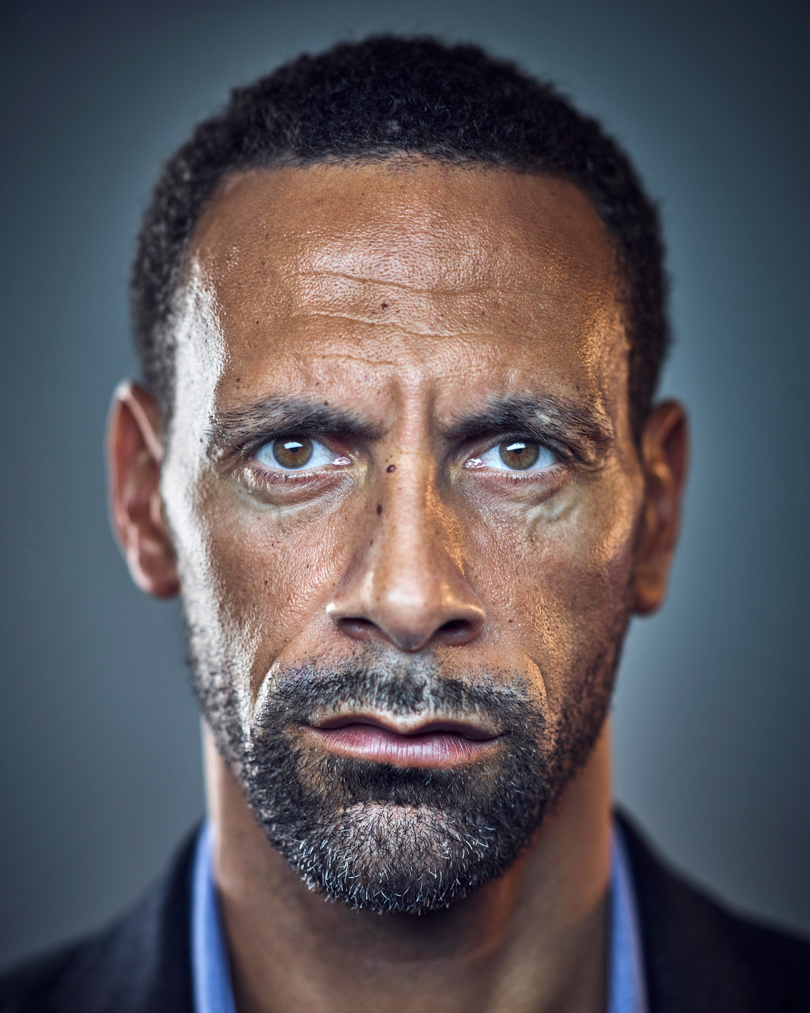
Perhaps it was a sign of Ferdinand’s ambition that even a run to the Champions League semi-finals didn’t give him the feeling that he’d made it as a player at the top level. “Not really, because we’d gone out,” he insists. “I still felt like I had lots to do. I thought, ‘Wow, that Valencia team are a few strings ahead of us’ – and they didn’t even win the final against Bayern Munich. Although I was playing well, I wasn’t where I wanted to be yet.”
After another impressive season for Leeds, though, he was ready to start for England at the 2002 World Cup. They were his first-ever appearances at a major tournament – Ferdinand was part of Glenn Hoddle’s France 98 squad without seeing any action, and narrowly missed out on selection for Euro 2000 under Kevin Keegan.
After helping Sven-Goran Eriksson’s side beat Argentina 1-0 in the group stage, he scored with a header against Denmark in the last 16 – even if it needed an assist from goalkeeper Thomas Sorensen, who inadvertently bundled the ball over the line. “I made sure I got that goal because it could have been taken off me – it wasn’t actually on target!” smiles the 41-year-old.
“But that tournament was the time when I started thinking, ‘I’m a top player and I’ll go on to be a top player.’ I played and just felt comfortable in that setting, under that pressure. We were up against a good Argentina team and there was a lot riding on it. I had to deal with someone like Gabriel Batistuta. He was their main goal threat – he was the man back then.” Ferdinand jokingly looks downwards to inspect his pocket. “He could still be in there somewhere!”
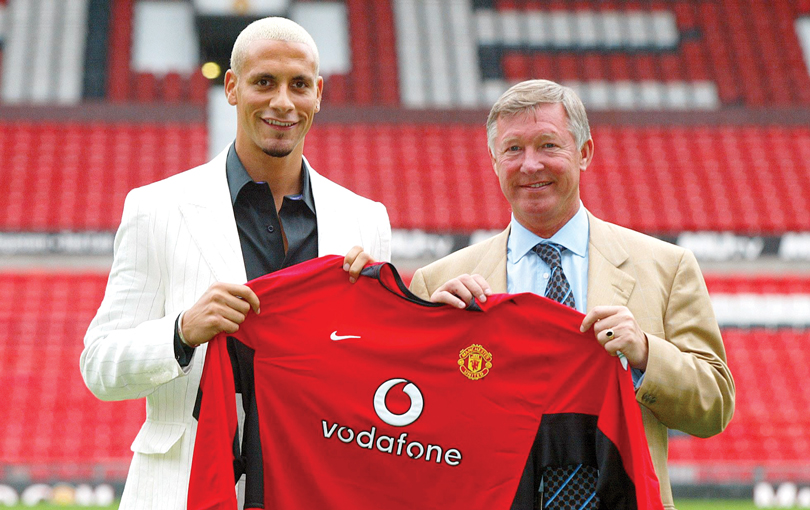
Ferdinand wasn’t the only one who thought he would become a top player after the World Cup – Alex Ferguson did too, sealing a £29.3m deal for the 23-year-old within a month of Brazil lifting the trophy. Leeds had missed out on Champions League qualification, so when the defender learned of Manchester United’s interest, he refused to leave chairman Peter Ridsdale’s office for six hours, insisting a move be agreed to take him to Old Trafford.
“There was no way I wasn’t going,” he reveals. “I would have done anything. The be all and end all for me as a kid was to win trophies. I got to the point where I was seeing others with loads, and I didn’t want to end my career without anything in my cabinet. I knew that joining Manchester United would give me a great chance.”
The transfer made him the world’s most expensive defender for a second time, after French World Cup winner Lilian Thuram pipped him with a £23m switch to Juventus in 2001.
FFT asks what Ferdinand remembers most about that day. “Other than the suit?” he laughs, recalling the garish white outfit he donned for his unveiling (below). “It was just an unbelievable day – although when I signed, I remember Alex Ferguson asking my mum, ‘Is he all right, he doesn’t seem happy?’ She said, ‘Until he starts playing, you won’t see the enjoyment – you’ll see it when he plays.’
“The thing I remember most is the press conference, because they asked, ‘What do you want to get out of this move?’ I said that when I finally left Man United, if I could walk out of Old Trafford with my head held high, having etched my name somewhere in the history of the club, that would mean I’d done well – that meant trophies.”
He achieved exactly that. “Yeah,” he smiles. “They were the best years of my playing career. It was hard work over a long period of time, with a great bunch of people.”
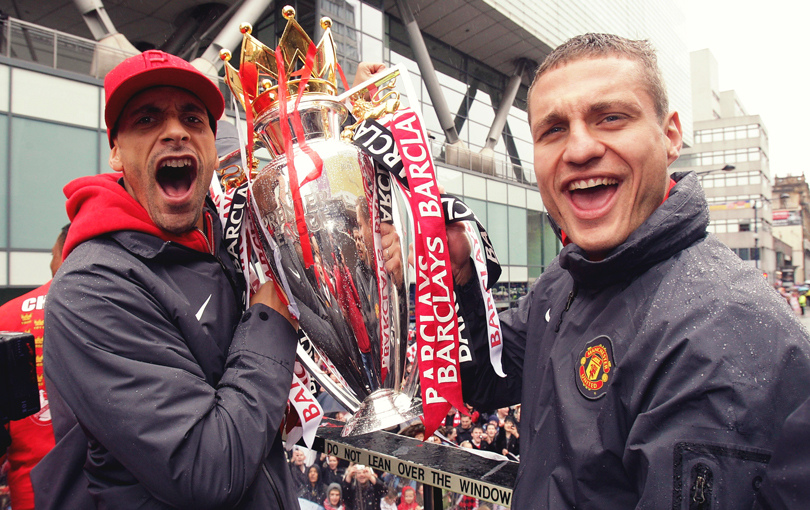
Among those people was his long-time central defensive partner Nemanja Vidic. “We just gelled,” says Ferdinand. “In a partnership, having the same attributes makes it more difficult to work as a pair. We had some similarities, but there were also some big differences between us. I liked sweeping up behind – if there was any problem for anyone, I liked to be the security blanket. Vida loved to attack the ball first. He was the aggressor.”
They were also united by a motivation to win Ferguson’s approval. “He was different to Harry Redknapp in that he didn’t really praise me – he was fearful that maybe I’d get big-headed and think I was the man,” explains Ferdinand. “He thought that a lot about people from London – I think he had a certain idea about how Londoners are. But it was probably good for me that he didn’t, as I always felt that I had something to prove to him. Me and Vida were the same like that – we used to talk about it a lot.
“Sir Alex would say, ‘Cristiano, Rooney, Tevez, Berbatov, Giggs and Scholes – brilliant’, but he’d never really name-check us. We used to think, ‘We’re keeping clean sheets every other week here – what’s going on?!’ But it kept us hungry. We wanted to prove ourselves to him and get the recognition that we both felt we deserved. It was a great bit of management.”
Naturally, there was a hairdryer or two as well. “The main one was after a game at Bayern Munich [in March 2010],” recalls Ferdinand. “I disagreed with his tactics in that game. We lost 2-1 and I thought we should have done something different, so I was screaming and shouting. Then he walked in and just shut the place down with his screaming and shouting over mine!”
Looking back, who was right that night? “I was right, because we lost!” he smiles. “But I think he appreciated that when I’d shout or resist against certain things, tactics or something he was saying, it wasn’t from a selfish point of view. It was from a team perspective, because I wanted us to do well.”
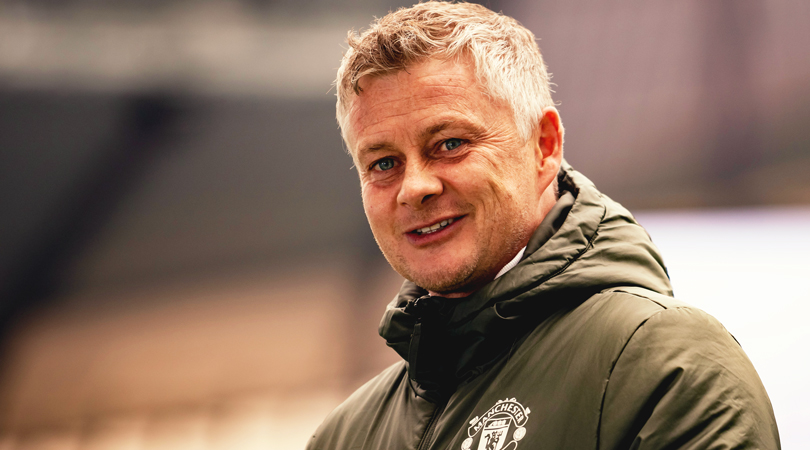
YOU ASK THE QUESTIONS Ole Gunnar Solskjaer – "I want to play with creativity and imagination, just as I learned under Sir Alex Ferguson"
Ferdinand would go to another World Cup with England in 2006 and impress again: Eriksson’s men conceded only twice in five matches. “I saw a stat the other day: I played 10 matches at the World Cup and kept seven clean sheets – that’s an unbelievable stat, so all the strikers just never did their jobs!” he says. “I loved the big occasions and the big matches – the build-up, everything about them. I loved playing for England at World Cups.”
That Ferdinand excelled there said plenty about him, considering many regard the World Cup as the ultimate test of a player’s ability. “I don’t agree – the Champions League is,” he insists. “You go to the World Cup and no disrespect, but you can be playing Peru or some country that’s ranked 200th in the world. The Champions League is the elite of the elite – by a smidgen, I think that’s the most difficult competition to win.”
When asked to pick his best-ever performance, it’s perhaps little wonder that he chooses a game from the 2007-08 campaign, and United’s run to Champions League glory. “The Camp Nou,” he says, referencing the night when United returned home with a 0-0 draw from the first leg of their semi-final, going on to win the second 1-0. “We kept a clean sheet in both legs of that semi against Barcelona, with their forward line: Samuel Eto’o, Lionel Messi and Thierry Henry.
“They had some ridiculous players, and over 180 minutes we kept them out. Not just for me as an individual, but as a team, it was our best defensive performance. That was all about concentration – it’s one of the biggest assets for any defender.”
Then came that final against Chelsea in Moscow. “It was a crazy night, something that will live long in my memory,” he says. “It was a mountain you thought you’d never be able to get up and conquer.”
When John Terry stepped up to take Chelsea’s fifth penalty in the shootout, did Ferdinand think United’s hopes of victory were over? “Yeah,” he admits. “I’d watched him take penalties in training with England, and he’d always been so cool and calm under pressure. At that point, I didn’t see it turning out the way it did.”
Terry slipped on the sodden surface and hit the woodwork, taking the shootout to sudden death. Anderson and Ryan Giggs converted United’s sixth and seventh penalties, before Edwin van der Sar kept out Nicolas Anelka’s spot-kick to secure victory for Ferguson’s men.
“I was next, so I was f**king happy Edwin saved Anelka’s penalty,” says Ferdinand, revealing that he was eighth on the Red Devils’ list. “My legs were jelly and I didn’t know what was going to happen – I wouldn’t have scored, man. I was too nervous.
“When we finally won, the feeling was unbelievable. The only way I’ve described it is if you could bottle that emotion and sell it, you’d become a billionaire. You don’t get that feeling anywhere else. To be a football player and conquer that... it’s f**king mad.”
That ability to challenge for the biggest honours with United was what persuaded him to turn down offers from the most high-profile overseas clubs. “Fabio Capello tried to take me to Roma when I was at West Ham, and later on I received offers from both Real Madrid and Barcelona,” he admits. “But when you get to Manchester United and you’re winning, it’s hard to leave that. Winning is an addiction, and once I was at United, I felt I was at the top of the tree.
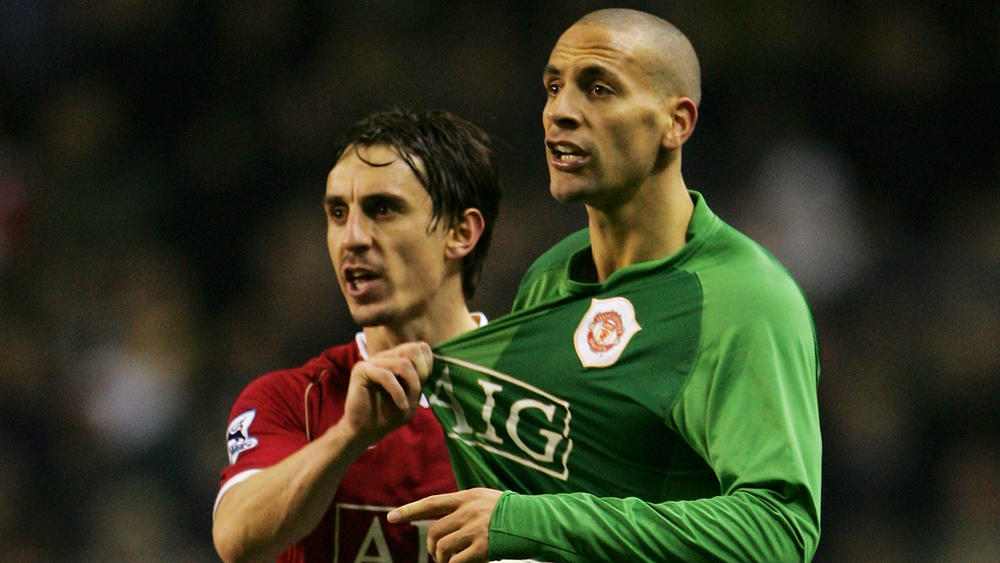
“The times when I got offers to go to Real Madrid and Barcelona, they were in transition. I’d have been leaving and hoping they came back to being great again in the next two or three years. But I didn’t want to wait. I was winning then and wanted to continue winning.”
Ferdinand won 10 major trophies during his Manchester United career, even if they eluded him at international level with England. He never played at the European Championship – banned in 2004 for missing a drugs test. He was due to skipper the Three Lions at the 2010 World Cup, but injury struck a week before the start of the tournament.
“That killed me,” he sighs. “But sometimes you play your best games when you’re not there, because we were terrible.”
Ferdinand’s legacy for club and country was already secure – he is rightly regarded as one of England’s finest centre-backs. “It’s nice when people say stuff like that,” he smiles. “You play football to win trophies and earn respect from your peers. I always knew my worth in the team I was in. If I wasn’t there, I wanted all the other players to think, ‘We’re not as good when Rio doesn’t play.’ I’d like to think I got somewhere near that.”
Of that, there is little doubt. When a poll was conducted recently to select England’s greatest team, Ferdinand was picked to partner Bobby Moore at centre-back. And as was pointed out to him shortly before 2am on that 2008 night in Moscow, only three players have ever lifted the European Cup for Manchester United: Bobby Charlton, Peter Schmeichel and Rio Ferdinand. It’s not bad company to keep.
Subscribe to FourFourTwo today and get a FREE England Euro 96 shirt!
NOW READ
RICHARD JOLLY Why do Chelsea struggle to win after falling behind?
ROY HODGSON Why his unique achievements in football may never be equalled
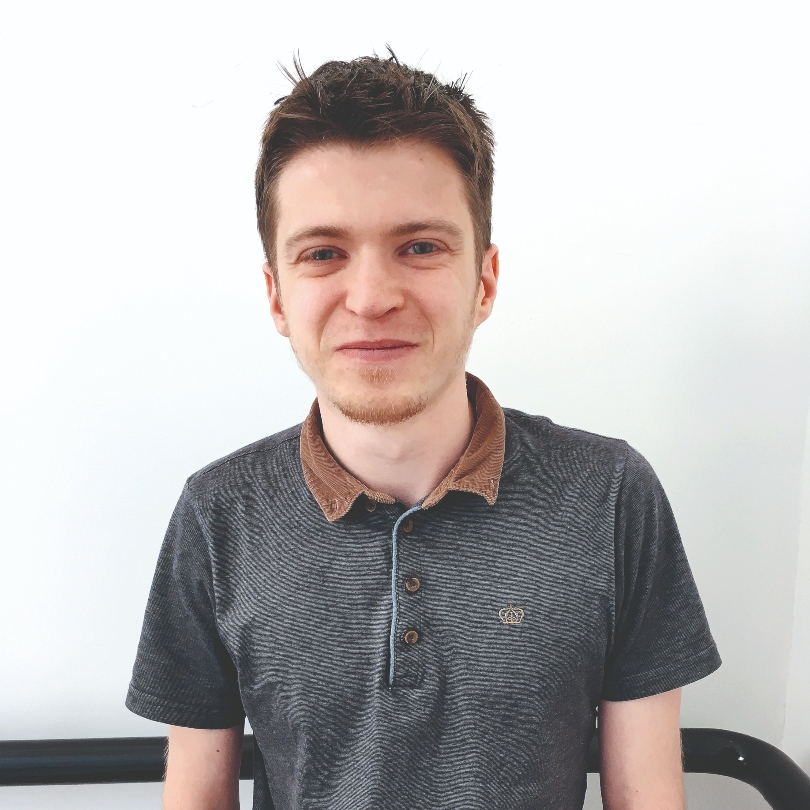
Chris joined FourFourTwo in 2015 and has reported from more than 20 countries, in places as varied as Ivory Coast and the Arctic Circle. He's interviewed Pele, Zlatan and Santa Claus (it's a long story), as well as covering the World Cup, AFCON and the Clasico. He previously spent 10 years as a newspaper journalist, and completed the 92 in 2017.
 Join The Club
Join The Club










